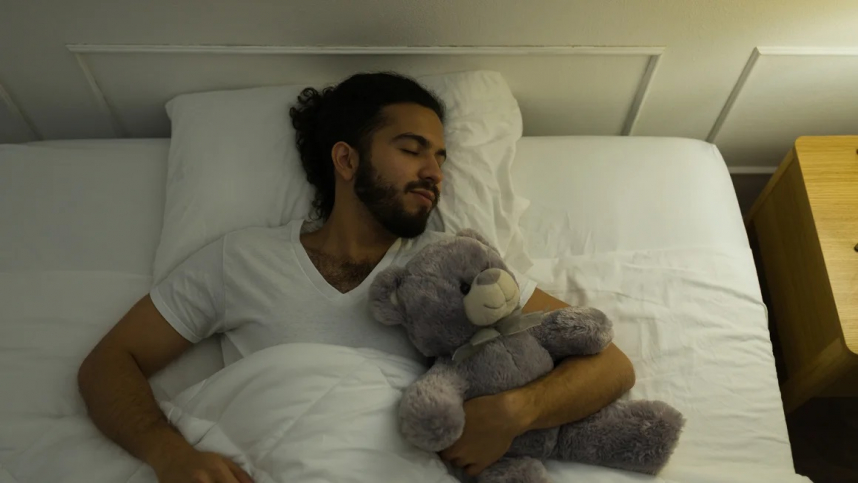
Max Genecov is a doctoral candidate in clinical psychology at the University of Pennsylvania, a dad, and a stuffed animal owner. “I’ve always had them growing up, I had a big fantasy life with them (as a child),” he said. “I just think that they’re nice things you have.”
He has a plush raccoon from his childhood, crochets them when friends or family have babies, and still sometimes hugs a stuffed animal or uses one as a pillow when he sleeps, he said.
It might sound unusual, but when you think about it, is it?
Plush sales grew over the Covid-19 pandemic, and in 2024, 21% of plush toys were sold to adults over 18, according to Juli Lennett, US toys industry adviser at Circana, a market research and technology company in Chicago.
Stuffed animals “struck a chord with young adults and adults as a means to entertain, collect, and provide comfort during the pandemic,” she said in an email.
Build-A-Bear even has an entire section of its website dedicated to products for grown-ups. A survey the company commissioned found that more than half of the people held on to a childhood stuffed animal, and about 40% said they sleep with a plush toy.
“I wonder if people are seeking more comfort in the face of uncertainty,” said Dr. Jade Wu, a sleep psychologist and founder of Thrive Sleep Clinic in Durham, North Carolina. And for people living on their own, it could be nice to have something to cuddle with at night, she added.
There is nothing wrong with having a stuffed animal as an adult or using one to sleep better, experts said. In fact, there are a lot of positives to it.
Stuffed animals are for anyone
As a mental health therapist in Seattle, Dr. Jessica Lamar uses stuffed animals with adults who are working through trauma, she said.
They go to Build-A-Bear and make a bear to represent their inner child or a younger version of themselves so they can heal trauma from childhood, she said.
Patients giving the bears the comfort, connection, and compassion they might not have gotten enough of as a child can be very helpful, Lamar added.
But stuffed animals aren’t just for people working through trauma. Anyone can benefit from the gentleness, softness, and self-soothing that a cute, plush object can bring, Genecov said.
Lamar agreed, noting that a stuffed animal you’ve had since childhood can provide nostalgia, a connection to family or friends you are far from, and a touchpoint for pleasant memories.
“It can be very cozy, relaxing, and nice,” Wu said. “There’s no reason why adults can’t have the benefits that kids get.”
It’s not immature to cuddle with a stuffed
But that is the problem– stuffed animals are for kids, you might be thinking.
“If we think about it from the lens of being like a healthy, balanced adult, I think it’s really helpful to say, ‘Hey, I am this adult who’s in college, and I still have this healthy attachment to my childhood,’” Lamar said. “It’s wonderful to be able to say, ‘This is a part of my child self that I want to stay connected to.’”
Maybe there would be an issue if someone became severely distressed or unable to sleep when they were separated from their stuffed animal, Lamar said. It could also be a problem if people used their stuffed animals to avoid other issues, said Dr. Barbara Greenberg, a clinical psychologist in Weston, Connecticut.
But both said they haven’t seen that become an issue.
In fact, using a stuffed animal to feel better could be good modeling for the kids in your life, Greenberg said.
“This is one of the ways to self-soothe. We take something like an animal into our bed; it’s comforting,” she said. “That’s one of the things you have to teach kids when they’re young, how to self-regulate, how to self-soothe.”
Especially important is to let boys keep their stuffed animals; they need self-soothing too, Greenberg said.
A sleep buddy
A stuffed animal in your bed at night might be meeting evolutionary needs, Wu said.
“We evolved to live in tribes and to have a village,” she said. “We sleep the best when we feel safe, so when we’re feeling vulnerable … then we want that bodily contact.
“Social sleeping makes us feel safer and sleep better. So, a stuffed animal may be sort of a good alternative to having someone else sleeping in your bed.”
An ornate glass bottle of half-empty whisky with a set of glasses and tumblers on a serving tray, in an atmospherically lit on old-fashioned, classy wood-panelled bar.